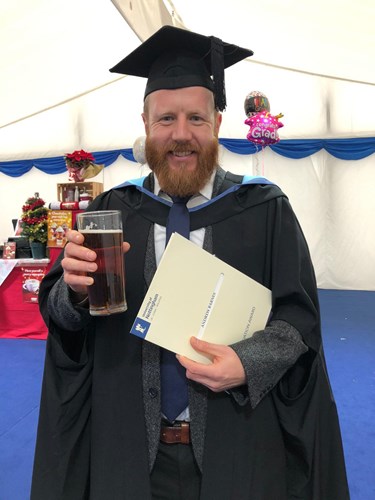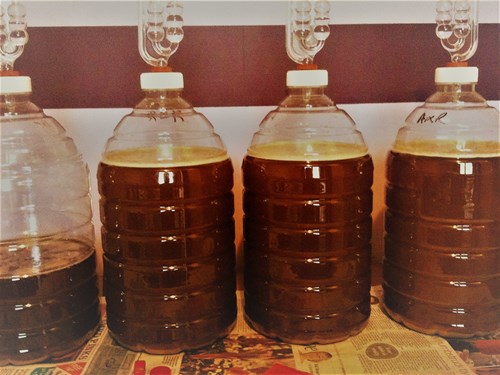A hobby that got out of control
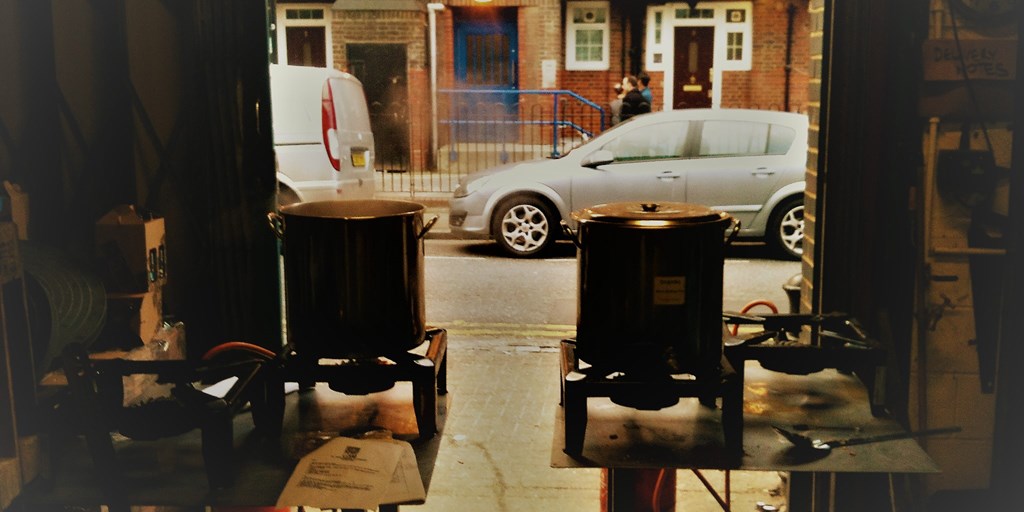
"It didn’t take long before my Dad and I were purchasing brewing kit in order to make beer of our own"
I always wanted a hobby - something to become passionate about, or accomplished in. A distraction to offset my lack of passion for the direction my career was heading in. But I failed to find one in my twenties, despite trying to learn numerous languages, and purchasing instrument after instrument, none of which I managed to master.
My first exposure to brewing was in 2013. Laura (my wife, although girlfriend at the time) bought me a Brew Day at London Fields brewery for my 33rd birthday. I was living in Oxford in 2013, and I’d never heard of London Fields before - the brewery, or the place - but they both sounded intriguing. Earlier in the year we’d been to the Copenhagen Beer Celebration (organised and hosted by Mikkeller), where I’d sampled some of the most wonderfully bizarre beers I’d ever come across. It was a real eye-opener into a world of beer I never knew existed. I became more intrigued in craft beer after this trip, visiting some of the newly established craft beer bars in London with friends who were quite literally lapping up the burgeoning beer scene there. But I wasn’t fully converted at this point, and I still almost always favoured
a pint of real ale.
On the morning of the brew day I travelled up to London with my Dad. He’d been bought the same present for his birthday; in effect we were gifted each other’s company for the day in addition to the opportunity to learn something new – I think we were both looking forward to the brewing most. We were typically early, a trait I have definitely inherited, but it wasn’t long before we were inside the brewery with a hip and happening American dude giving us a talk on the main brewing ingredients and the primary process steps. I remember thinking that everyone seemed happy; the staff behind the trendy looking bar, the brewers attending to their jobs for the day, and our host, who was passionately and animatedly describing the beers he’d helped design. There was a real buzz around the place, and it seemed an exciting place to be, at an exciting time for craft breweries in London.
We were given a recipe sheet to brew an Amarillo single-hopped version of Hackney Hopster. We weighed out the ingredients and started mashing, then vorlaufing, then boiling, and then cooling the wort via a plate heat exchanger ready for fermentation. I remember there being a lot of waiting time between stages, where we got to ask questions, and generally hang about pretending we were proper brewers. Passers-by and local residents had a view into the brewery from the open brewery doors, which provided fresh air to us, and offered malty aromas and the hits from a local radio station to them. I did wonder what they made of all of this, in an area known for gentrification… but that’s a topic for another day.
The brewery was surprisingly small, so to avoid being in someone’s way the safest place to wait during brewing stages was definitely in the tap room, where we felt obliged to try some (many) of the beers on offer. We left carrying a number of large plastic containers down Cambridge Heath road to Bethnal Green station, and then back to Paddington and Reading. As awkward as this was at times, with the beer sloshing about and the containers knocking into our knees, I enjoyed the looks I was getting. I remember feeling a real sense of achievement when I finally got home, and knew I wanted to repeat the experience again.
It didn’t take long before my Dad and I were purchasing brewing kit in order to make beer of our own. We bought a basic cooler box style mash vessel, a stainless steel kettle for boiling, and a fermentation bucket.
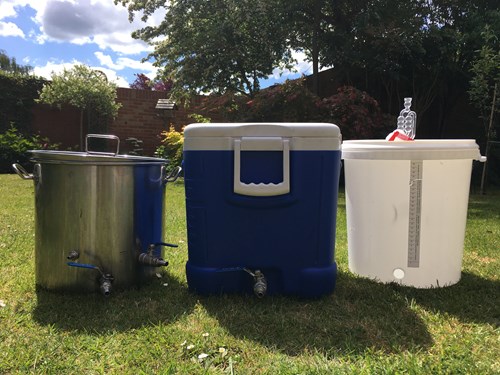
The first beer we brewed was a repeat of the Hackney hopster we’d brewed at London Fields. I remember trying this beer after a long drive to Devon, on a Friday evening, where we were congregating for a family weekend away in a holiday cottage. Laura and I arrived later than everyone else, and much later than beer o’clock, so we quickly scuttled through the front door to sharply make a beeline to the fridge where we excitedly poured the homebrew. I remember drinking this beer with so much glee - not just because of my eagerness to quench my thirst, but because it was something we’d made. It tasted surprisingly good, and everyone was really enjoying it.
The pleasure I got from brewing beer at home and then seeing other people enjoy the final product was a real motivator for me. I’d always felt like I had some specks of creativity floating about somewhere inside of me, and finally it felt like I’d found an outlet for them. Friends and family were often surprised at the standard of beer we could make in the garage, but it wasn’t uncommon (some might say annoyingly inevitable) for me to find some kind of fault in the final product. Personally, I don’t think I was picking fault for the sake of it, and always offered a solution to address the problem. Unfortunately for our bank balances, this more often than not resulted in buying more and/or better kit.
As we upgraded our equipment our beers definitely improved. We became able to hold mash temperature better, sparge in a more consistent way, and regulate fermentation temperature. Although each process improvement was backed-up by rationale largely discovered on the internet, I often found I had unanswered questions, and I always wanted to understand more about why I was doing what I was doing. Now, at this point I think most people would probably have just bought a book, or found other like-minded homebrewers to share brewing questions with. I, however, decided to opt for a less obvious option; and in the Spring of 2014, I applied for a part-time MSc in Brewing Science at Nottingham University.
The covering letter accompanying my application read:
“I want to become a brewer. I find the beer making-process fascinating; it excites me how slight changes and tweaks to a process, or ingredients used in that process, can have a significant impact on the taste, appearance, and aroma of beer. I want to understand the science behind beer, to learn what causes the nuances and variations of beer, and to ultimately make beer that people will enjoy. I’m charmed by the history and tradition of beer, but excited by the scope for creativity and innovation.”
A month or so after submitting my application I had a call from the course convenor. Paraphrasing, the sentiment of the call went something like this:
“Andrew, I can see that you’re very enthusiastic about brewing, but at what level did you last study a Science subject?”
I’d neglected to appreciate that the entry requirement for a Masters degree in a science subject would be an undergraduate degree in a science subject. Funny that!? What wasn’t funny was having to confess to this distinguished, and highly regarded brewing professor, that the last time I studied a science subject was… GCSE.
Despite not meeting the entry requirements I was kindly allowed access to a snippet of the course material in advance of the course starting, to see the level at which the teaching would be pitched at. I think this was probably to deter me. Although I didn’t understand most of the words, let alone the broader content, I decided that it would be a good idea to pretend that I did; and I was allowed to join the course to study the first module starting in October 2014. This was on the proviso that my place would then be reviewed after the first module, before progressing any further. Irrespective of this, it was a thrill to be accepted onto the course, and although I felt apprehensive at the scale of the challenge ahead of me, I was determined to do my best.
The course content was accessible online, and different modules were released each term. At the end of each term there was a residential element to the course, with exams. The course was predominantly for brewers already working in the industry, or recent graduates of biochemistry, or microbiology etc. And as I sat down at the beginning of the first term, trying to get to grips with water chemistry, it’s safe to say that I was utterly and completely out of my depth.
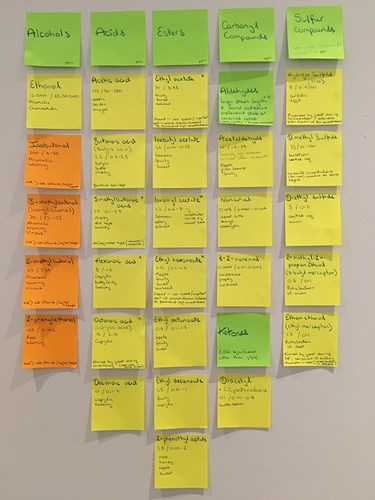
I met some really interesting people on the course from some of the world’s largest brewing companies. Although my interest and passion was centred around craft brewing, and homebrewing more specifically, I found it really interesting learning how large breweries operate. Especially with regards to the level of precision and testing required to produce a consistent product, time and time again. Although I do remember sitting in one beer quality management lecture, next to an American craft brewer from Allagash, who was doing a very good job of persuading me that everything we were learning was sucking the fun, and the art, out of brewing. I think to some extent he probably had a point.
I worked really hard on the course, got surprisingly good grades, and was allowed to continue until the end. I felt so much more compelled to apply myself properly when compared with previous iterations of university; primarily because I was genuinely interested in what I was learning, but also because I wanted to prove that I could succeed on the course despite my unconventional start. I was also starting to view the MSc more and more as a route to a career change. To facilitate this, and to help with my studies more broadly, I looked to gain some practical experience of working in a brewery. Laura and I had moved to London just before the course started, in the late Summer of 2014, so there were plenty of local breweries to choose from. I spent a day helping out at Southwark brewery, and then a day a week for six months at Mondo Brewing Company having dropped a day per week in my main job to facilitate this. These were very different breweries, producing very different beers, on vastly different kits. Although I was only ever given fairly menial tasks to complete, I learnt loads about the inner workings of a brewery, simply by watching - as I cleaned, and cleaned,
and cleaned.
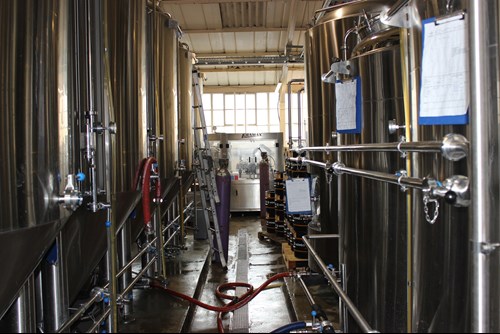
I left Mondo with lots of advice about how to upgrade my kit at home, and as a result we purchased a cylindroconical fermenter, a carbon dioxide tank, and started to transfer and carbonate beer under pressure, conditioning in corny kegs, and bottling using a bottling gun. Also, once I’d finally got to grips with water chemistry, we sent our water to a lab for analysis, allowing us to treat the water properly, and better manage pH and the concentration of certain ions. It started to feel like my processes at home, albeit a lot smaller, were mirroring much more closely the equipment and processes you’d find at a proper brewery.
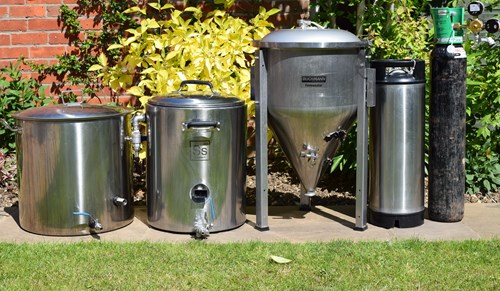
The brewing course took me five years to complete. It should have taken three, but I had a year off in 2016 when Laura and I got married; and I paused my online studies temporarily when I completed my research project. The research project was a significant part of the total marks towards my MSc, and having been fascinated and alarmed in equal measure by my microbiology module, I decided to investigate the prevalence of wild yeast in craft breweries. This was a major undertaking for me, and probably the hardest thing I’ve ever done academically. It involved designing the research, visiting breweries to take samples, analysing the results in a lab, compiling the results into a dissertation, and then presenting the results to the academic staff at the university. It was really hard; I was nervous visiting the breweries, even more nervous trying to perform DNA analysis in the lab, and on the edge of a breakdown - quite literally, before presenting my results. For the most part during the project I felt like a fraud, especially when working in the laboratory, where I just felt like I was going to knock something over the whole time. But I managed to complete it, and it was a huge relief when it was over. A number of local breweries helped to facilitate my research, as well as a very kind PHD student, and I’m so grateful to everyone who helped me out.
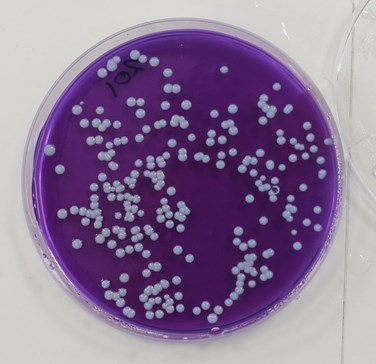
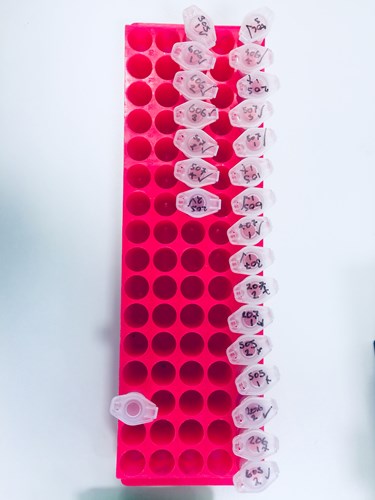
Like most of my essays at university, I’m probably well over my acceptable word limit now, so before I lose focus too much, let me conclude by saying that I graduated in December 2019 with a distinction. Quite frankly, I’m not sure how I managed to do that. But I do know that it involved a lot of hardwork and determination, and an even greater amount of help and support from Laura - both emotionally, and by letting me off the housework for four years.
So, with an Msc in Brewing Science in one hand, and a pint of beer in the other, it seemed clear that my hobby was very much got out of control. Homebrewing in the garage was the answer to lots of things. It allowed my Dad and I to share a common interest, and it allowed me to focus my attention on something I was passionate about – beer! But there was one lingering and niggling thought in my mind that I hadn’t answered, and that was whether we could commercialise our homebrewing operation, and become a proper brewery, selling our beer to proper customers. It was something I’d always thought about, and something I knew deep down I wanted to do, but whether it would be possible or not, I didn’t know. I’ll pick this up in our next blog “Turning an out of control hobby into a commercial brewery”.
